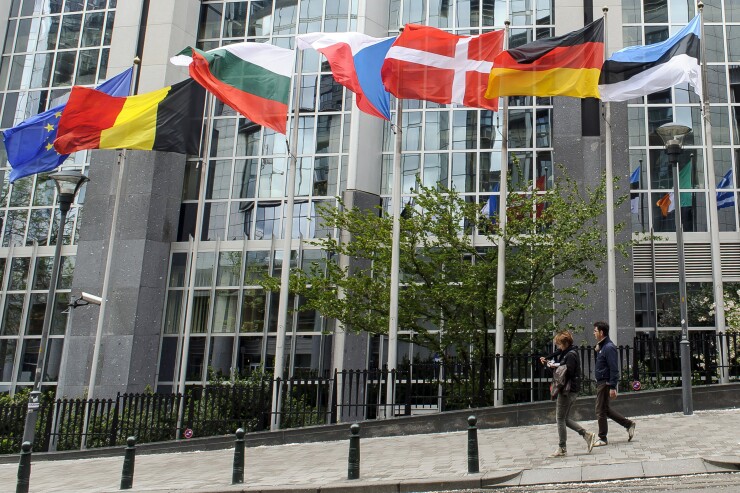Want unlimited access to top ideas and insights?
The European Central Bank made a play for power over London’s lucrative clearing industry, bolstering its case in a key issue in Brexit talks between the European Union and the U.K.
The Frankfurt-based ECB seeks to change its legal statute to be given a “clear legal competence” over clearing of euro-denominated financial instruments, it said in a statement on Friday. Specifically, it asked to change Article 22 of its statute to say:
“The ECB and national central banks may provide facilities, and the ECB may make regulations, to ensure efficient and sound clearing and payment systems, and clearing systems for financial instruments, within the Union and with other countries.”

The central bank said the legal change would allow it to fully exercise the powers laid out in a clearing proposal from the European Commission. These include “a significantly enhanced role” for the ECB and euro-area central banks in supervising clearing houses, particularly systemically important ones located outside of the EU.
The proposed amendment was sent to the European Parliament and to EU heads of state for adoption. The ECB said the EU Commission will issue an opinion on the recommendation.
The topic of whether euro clearing can stay in London, which dominates the business, after Britain leaves the EU has become a key point of tension in Brexit talks, with thousands of jobs at stake. The ECB insists that it needs oversight of activities that can affect its monetary policy, while the U.K. says fragmenting the industry will push costs up for everyone.
The ECB said its recommendation follows on from a previous court case in 2015, before the U.K.’s Brexit vote, when it tried to bring clearing inside the euro area. It lost that case because it was deemed to lack the legal competence necessary to regulate clearing systems.
Clearinghouses stand between the two sides of a derivative wager and hold collateral, known as margin, from both in case a member defaults. About 75 percent of trading in euro-denominated interest-rate swaps takes place in the U.K., according to Bank for International Settlements data from April 2016.
A spokeswoman for London Stock Exchange Group Plc, majority owner of the world’s largest clearinghouse, LCH, said she couldn’t immediately comment on the ECB’s statement. LCH handles over 90 percent of cleared interest rate swaps globally and 98 percent of all cleared swaps in euros.
ECB policy makers have been increasingly assertive on the issue. Bank of France Governor Francois Villeroy de Galhau on Thursday pressed the case for forcing major euro clearinghouses to base their operations in the EU. ECB Executive Board member Benoit Coeure has hailed the EU Commission’s proposal on the issue as a step in the right direction.
The Commission has proposed a two-tier system for non-EU clearinghouses. Smaller firms would carry on operating under existing rules, while those deemed systemically important to EU financial markets would face stricter scrutiny and, ultimately, could be forced to move clearing of EU derivatives inside the bloc.
The Bank of England responded to a request for comment on the ECB’s recommendation by referring to a speech this week by Governor Mark Carney, in which he said fragmentation by jurisdiction or currency would reduce the benefits of central clearing.
The International Swaps and Derivatives Association pointed to a letter it sent to the EU Commission this month, in which it cited a survey finding that a location policy for euro clearing in the euro zone would result in significantly higher initial margin requirements for clearing firms.
The ECB’s recommendation was effectively endorsed by Austrian Chancellor Christian Kern on Friday. Asked about the statement, he said his personal opinion was that “the ECB has done a great job, an amazing job. President Mario Draghi has saved Europe. So therefore it makes a lot of sense to give them more means to do the job.”





